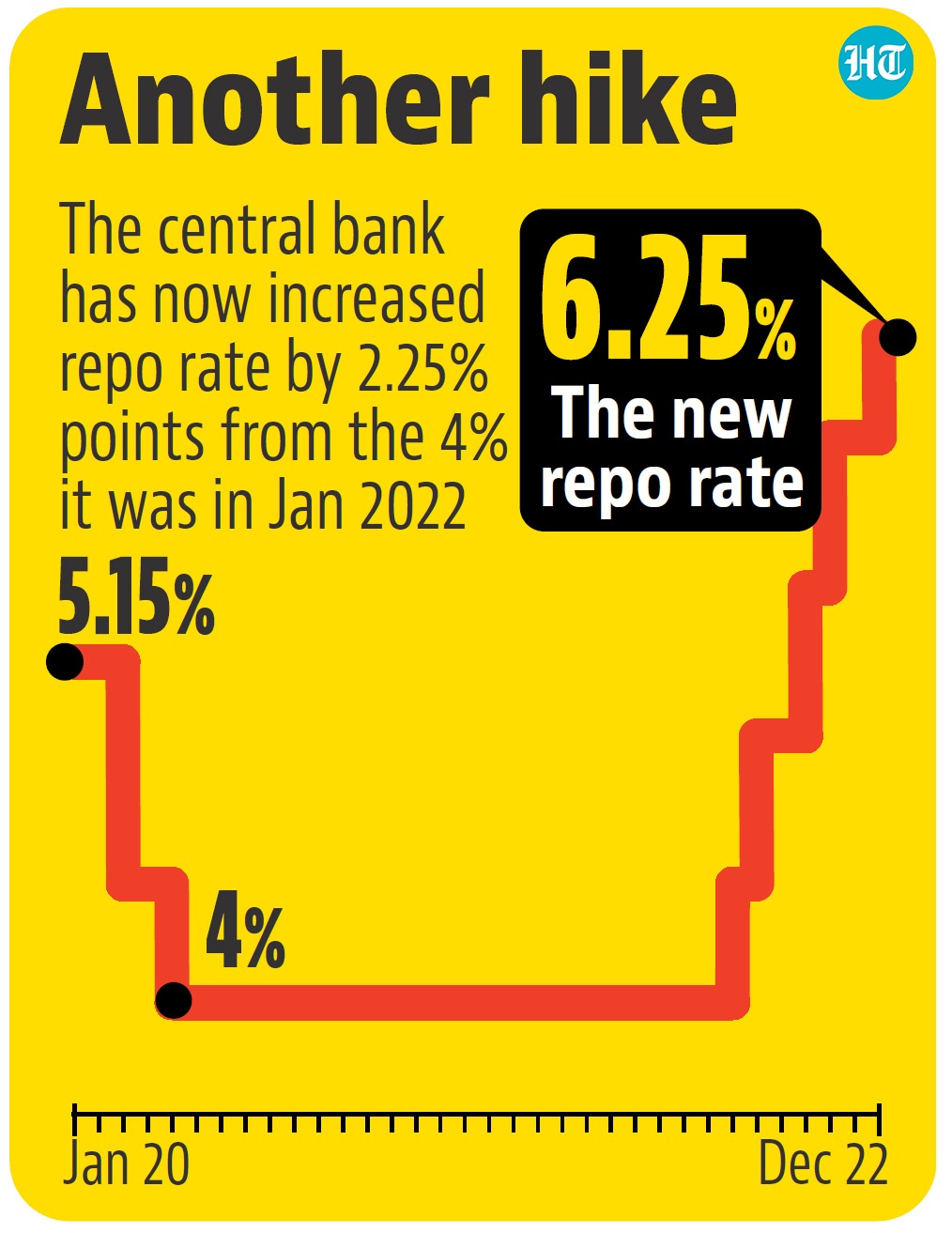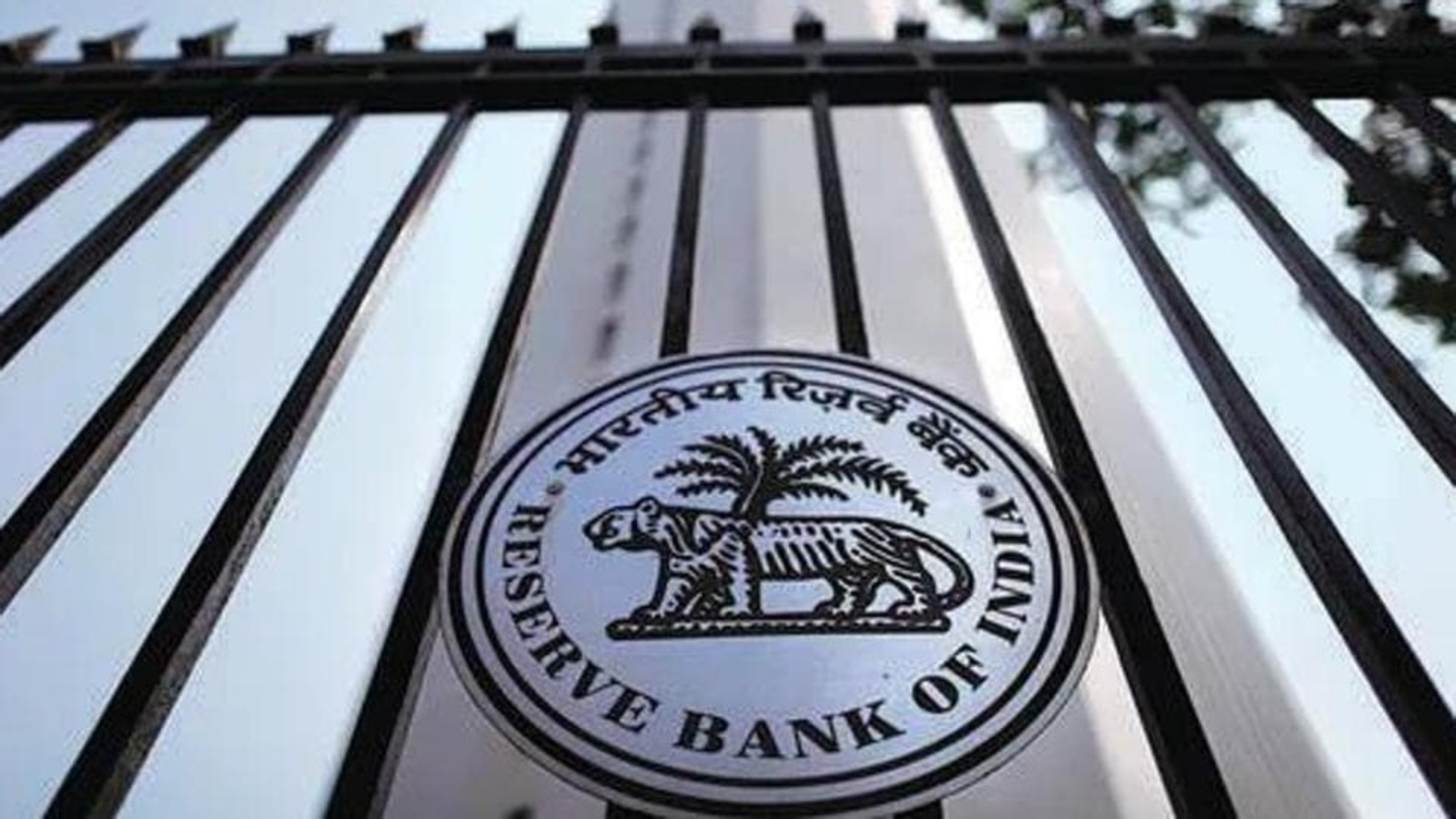RBI raises repo rate by 35bps to 6.25%, highest since March 2019
Loans and mortgages will get more expensive with the Reserve Bank of India’s Monetary Policy Committee (MPC) announcing a fifth consecutive interest rate hike on Wednesday, of 0.35 percentage points, taking the policy rate to 6.25%, the highest since March 2019.
RBI has taken up the policy rate by 2.25 percentage points since May, and the tone and tenor of its statement, as also the vote break-up – one of the six members of MPC voted against a rate hike; and two voted against the continued focus on “withdrawal of accommodation to ensure that inflation remains within the target…” – suggest that there could be another rate increase in February.
To be sure, as analysts point out, much will depend on global factors including the actions of the US Federal Reserve (it has already signalled smaller rate hikes).
On growth, even though the MPC has made a downward revision to its 2022-23 GDP forecast – it now stands at 6.8% compared to 7% in the September resolution – Governor Shaktikanta Das reiterated that “even after this revision in our growth projection for 2022-23, India will still be among the fastest growing major economies in the world”. It expects the economy to expand by 4.4% this quarter and 4.2% next quarter, down from the 4.6% each it had previously projected for them.

But inflation, it is clear, remains the central bank’s primary concern. “On balance, the MPC was of the view that further calibrated monetary policy action is warranted to keep inflation expectations anchored, break core inflation persistence and contain second round effects. These actions will strengthen the medium-term growth prospects of the Indian economy,” Governor Das said in his statement after the meeting. “The main risk is that core inflation (CPI excluding food and fuel) remains sticky and elevated,” Das added, explicitly stating that “the battle against inflation is not over”.
MPC retained its inflation projection for the year at 6.7%, and expects it to be 6.6% this quarter and 5.9% next quarter. Inflation has been above the upper band of the central bank’s comfort level, 6%, since January. It expects inflation to be at 5% in the first quarter of next financial year, 2023-24.
Wednesday’s announcement marks the fifth consecutive rate hike by MPC, which started the current rate-hike cycle in an unscheduled MPC meeting in May. Before the latest hike, MPC increased the policy rate by 40 basis points in May, and 50 basis points each in June, August and September. One basis point is one hundredth of a percentage point. While the latest policy rate is the highest it has been since March 2019, real rates are likely to be lower as current inflation is significantly higher than what it was back then. “Adjusted for inflation, the policy rate still remains accommodative,” Das said in his statement.
MPC’s latest action is in keeping with the forecast by a Bloomberg poll of economists. Most analysts see MPC delivering yet another rate hike in its February 2023 meeting, but expect it to be of a smaller magnitude. “Given the RBI’s emphasis on pushing towards lowering core CPI inflation and pushing headline down towards 4%, we now expect a further 25bp hike in February taking the repo rate to 6.50%”, Rahul Bajoria, MD and head of EM Asia (ex-China) Economics, Barclays, said in a note. “We expect a 25bp rate hike in February 2023, taking the repo rate to 6.5%. This is in line with the real rate math. RBI has estimated India’s real neutral rate at 1%. Combining it with our one-year ahead inflation forecast of 5.25% gives a repo rate of 6.25%. With inflation trending higher than target, repo rate should be higher than 6.25%,” Pranjul Bhandari, chief India and Indonesia Economist, HSBC Global Research, said in a note. The repo rate, at which RBI lends to commercial banks, is the policy rate.
The logic of real rates still being lower notwithstanding, rate hikes by the central bank are expected to have an adverse impact on credit demand due to higher borrowing costs. “Since the rate hike cycle in May 2022, home loan products have become expensive by around 150bps before today’s hike. The lending rates have risen significantly, especially for the loans linked to External Benchmark based Lending Rate (EBLR) where there has been a 100% transmission of repo rate,” Shishir Baijal, chairman & managing director, Knight Frank India, a real estate consultant firm, said in a note. “This hike will further impact EMIs and reduce home affordability. Simply based on the interest rate impact in this rate cycle, the Knight Frank Affordability Index has recorded a cumulative deterioration of an average of 3% across the country.”
Hours after the RBI announcement, the BSE Sensex dropped for the fourth session on the trot, ending the day’s trading at 62,410.68 points after a loss of 215.68 pts, or 0.34%. Similarly, the broader Nifty 50 fell 82.25 points, or 0.44%, to end the day at 18,560.50. The benchmark 10-year yield, meanwhile, was at 7.301% on Wednesday as compared to 7.2486% the day before. Bond yields had eased to 7.2113% before the policy decision, tracking a slump in oil prices as the benchmark Brent crude futures declined below $80 a barrel. The Indian rupee however recovered to edge higher against the US dollar – settling at 82.47 after a rise of 3 paise over its previous close of 82.50.
For all the latest business News Click Here


